2019 LAW00150 Introduction to Business Law Assignment
VerifiedAdded on 2023/01/17
|8
|1861
|84
Homework Assignment
AI Summary
This document presents a comprehensive solution to a business law assignment, addressing various legal problems and short answer questions. It includes detailed analyses of legal issues, application of relevant rules and statutes, and identification of pertinent case law, such as Ermogenous v Greek Orthodox Community. The assignment covers topics like intention to create legal relations, the effect of contractual clauses, the concept of consideration, promissory estoppel, exclusion clauses, and implied terms in contracts. The solution provides reasoned conclusions for each problem, demonstrating a strong understanding of legal principles and their application in real-world scenarios. The assignment also examines the Goods Act and its implications on the quality of goods. Overall, the document offers a valuable resource for students studying business law, providing insights into legal reasoning and problem-solving within the context of contract law and related areas.
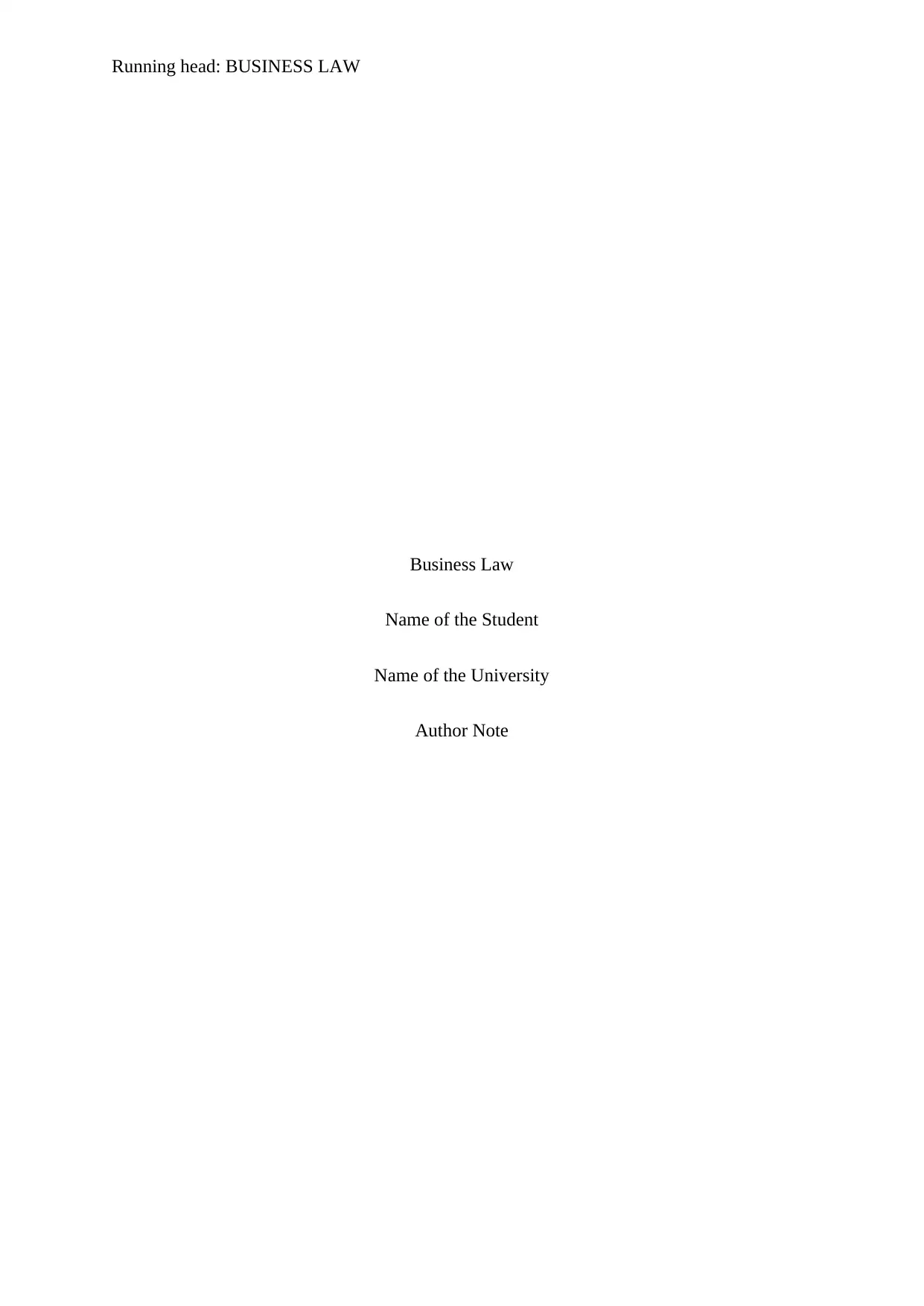
Running head: BUSINESS LAW
Business Law
Name of the Student
Name of the University
Author Note
Business Law
Name of the Student
Name of the University
Author Note
Paraphrase This Document
Need a fresh take? Get an instant paraphrase of this document with our AI Paraphraser
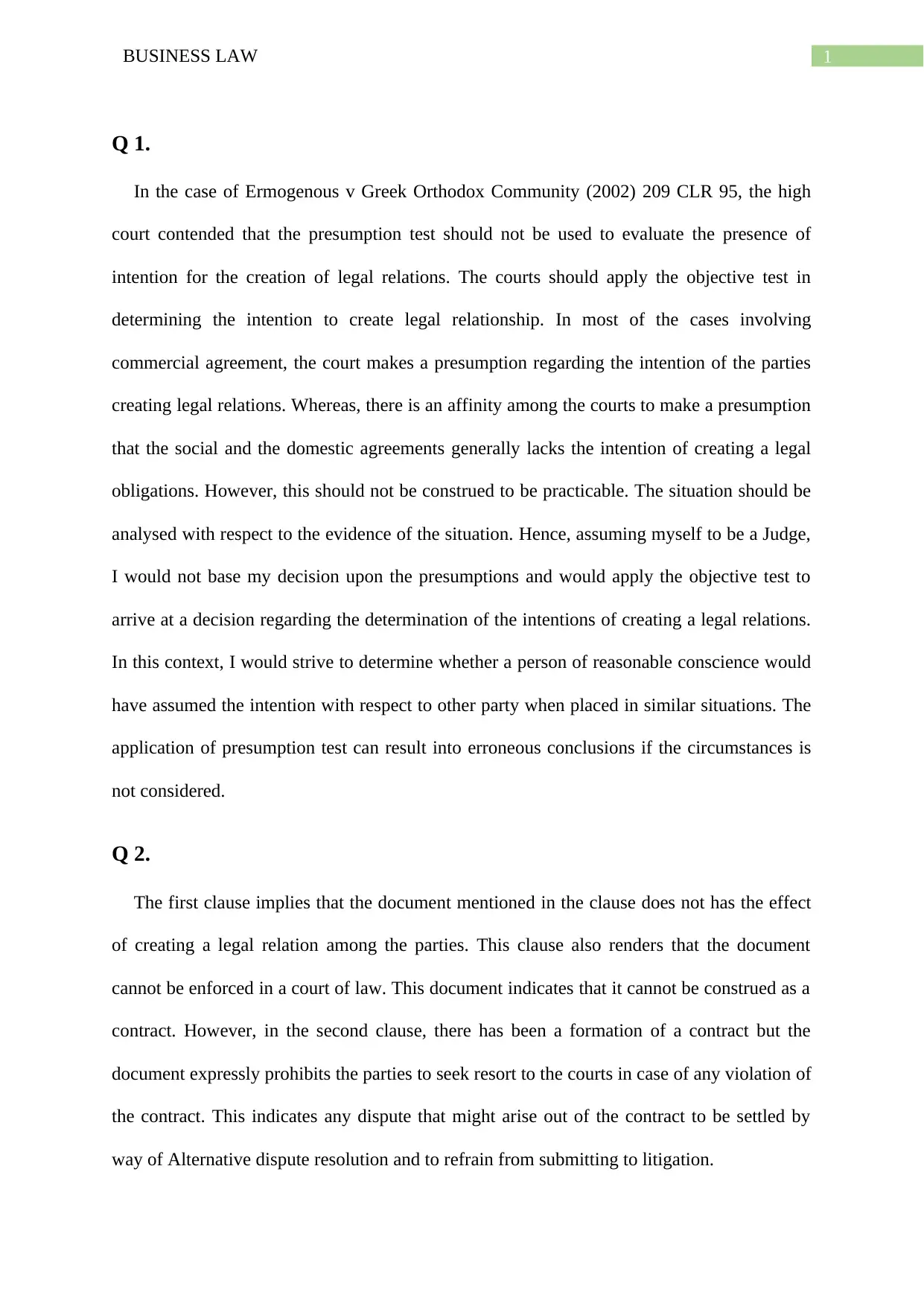
1BUSINESS LAW
Q 1.
In the case of Ermogenous v Greek Orthodox Community (2002) 209 CLR 95, the high
court contended that the presumption test should not be used to evaluate the presence of
intention for the creation of legal relations. The courts should apply the objective test in
determining the intention to create legal relationship. In most of the cases involving
commercial agreement, the court makes a presumption regarding the intention of the parties
creating legal relations. Whereas, there is an affinity among the courts to make a presumption
that the social and the domestic agreements generally lacks the intention of creating a legal
obligations. However, this should not be construed to be practicable. The situation should be
analysed with respect to the evidence of the situation. Hence, assuming myself to be a Judge,
I would not base my decision upon the presumptions and would apply the objective test to
arrive at a decision regarding the determination of the intentions of creating a legal relations.
In this context, I would strive to determine whether a person of reasonable conscience would
have assumed the intention with respect to other party when placed in similar situations. The
application of presumption test can result into erroneous conclusions if the circumstances is
not considered.
Q 2.
The first clause implies that the document mentioned in the clause does not has the effect
of creating a legal relation among the parties. This clause also renders that the document
cannot be enforced in a court of law. This document indicates that it cannot be construed as a
contract. However, in the second clause, there has been a formation of a contract but the
document expressly prohibits the parties to seek resort to the courts in case of any violation of
the contract. This indicates any dispute that might arise out of the contract to be settled by
way of Alternative dispute resolution and to refrain from submitting to litigation.
Q 1.
In the case of Ermogenous v Greek Orthodox Community (2002) 209 CLR 95, the high
court contended that the presumption test should not be used to evaluate the presence of
intention for the creation of legal relations. The courts should apply the objective test in
determining the intention to create legal relationship. In most of the cases involving
commercial agreement, the court makes a presumption regarding the intention of the parties
creating legal relations. Whereas, there is an affinity among the courts to make a presumption
that the social and the domestic agreements generally lacks the intention of creating a legal
obligations. However, this should not be construed to be practicable. The situation should be
analysed with respect to the evidence of the situation. Hence, assuming myself to be a Judge,
I would not base my decision upon the presumptions and would apply the objective test to
arrive at a decision regarding the determination of the intentions of creating a legal relations.
In this context, I would strive to determine whether a person of reasonable conscience would
have assumed the intention with respect to other party when placed in similar situations. The
application of presumption test can result into erroneous conclusions if the circumstances is
not considered.
Q 2.
The first clause implies that the document mentioned in the clause does not has the effect
of creating a legal relation among the parties. This clause also renders that the document
cannot be enforced in a court of law. This document indicates that it cannot be construed as a
contract. However, in the second clause, there has been a formation of a contract but the
document expressly prohibits the parties to seek resort to the courts in case of any violation of
the contract. This indicates any dispute that might arise out of the contract to be settled by
way of Alternative dispute resolution and to refrain from submitting to litigation.
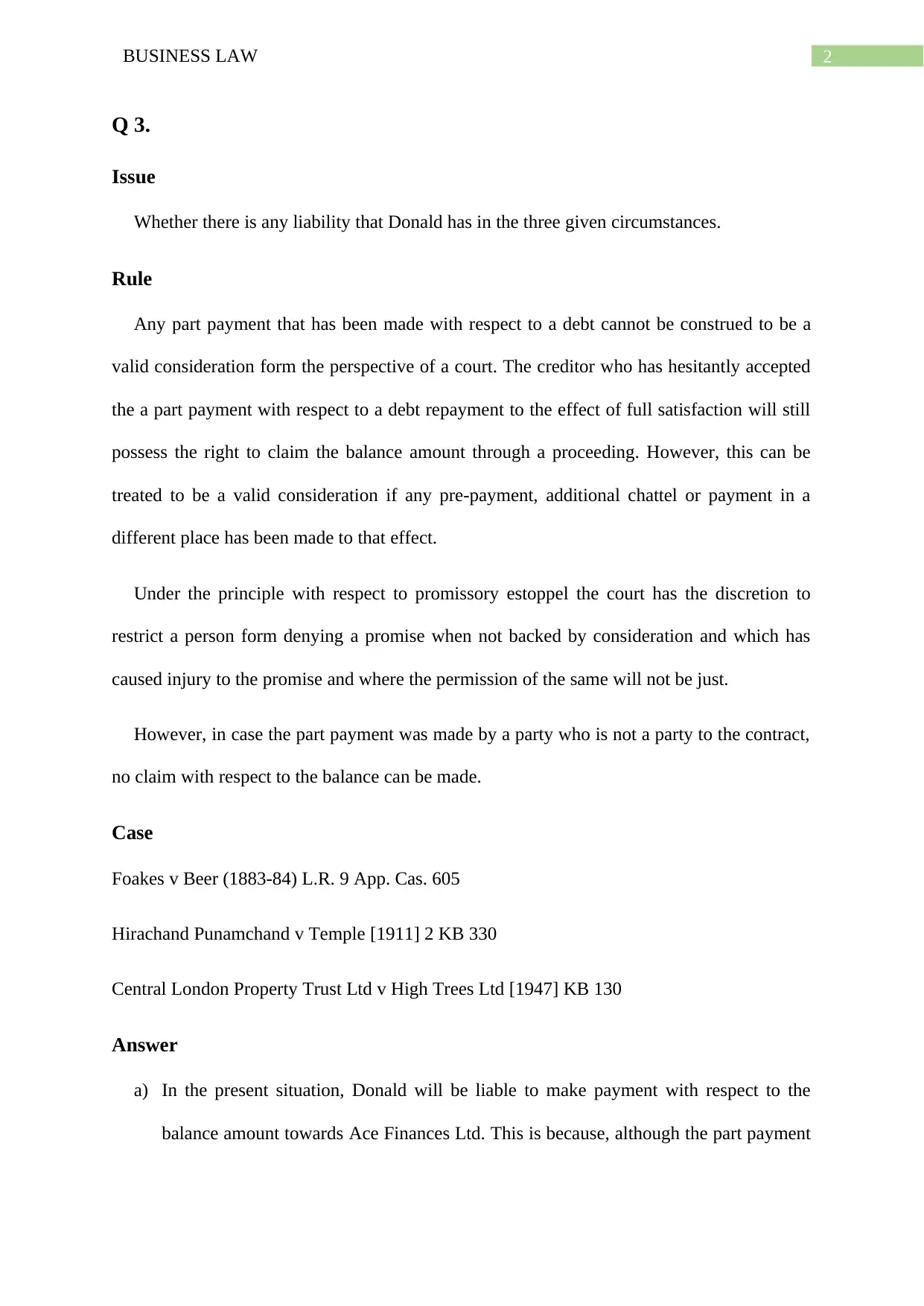
2BUSINESS LAW
Q 3.
Issue
Whether there is any liability that Donald has in the three given circumstances.
Rule
Any part payment that has been made with respect to a debt cannot be construed to be a
valid consideration form the perspective of a court. The creditor who has hesitantly accepted
the a part payment with respect to a debt repayment to the effect of full satisfaction will still
possess the right to claim the balance amount through a proceeding. However, this can be
treated to be a valid consideration if any pre-payment, additional chattel or payment in a
different place has been made to that effect.
Under the principle with respect to promissory estoppel the court has the discretion to
restrict a person form denying a promise when not backed by consideration and which has
caused injury to the promise and where the permission of the same will not be just.
However, in case the part payment was made by a party who is not a party to the contract,
no claim with respect to the balance can be made.
Case
Foakes v Beer (1883-84) L.R. 9 App. Cas. 605
Hirachand Punamchand v Temple [1911] 2 KB 330
Central London Property Trust Ltd v High Trees Ltd [1947] KB 130
Answer
a) In the present situation, Donald will be liable to make payment with respect to the
balance amount towards Ace Finances Ltd. This is because, although the part payment
Q 3.
Issue
Whether there is any liability that Donald has in the three given circumstances.
Rule
Any part payment that has been made with respect to a debt cannot be construed to be a
valid consideration form the perspective of a court. The creditor who has hesitantly accepted
the a part payment with respect to a debt repayment to the effect of full satisfaction will still
possess the right to claim the balance amount through a proceeding. However, this can be
treated to be a valid consideration if any pre-payment, additional chattel or payment in a
different place has been made to that effect.
Under the principle with respect to promissory estoppel the court has the discretion to
restrict a person form denying a promise when not backed by consideration and which has
caused injury to the promise and where the permission of the same will not be just.
However, in case the part payment was made by a party who is not a party to the contract,
no claim with respect to the balance can be made.
Case
Foakes v Beer (1883-84) L.R. 9 App. Cas. 605
Hirachand Punamchand v Temple [1911] 2 KB 330
Central London Property Trust Ltd v High Trees Ltd [1947] KB 130
Answer
a) In the present situation, Donald will be liable to make payment with respect to the
balance amount towards Ace Finances Ltd. This is because, although the part payment
⊘ This is a preview!⊘
Do you want full access?
Subscribe today to unlock all pages.

Trusted by 1+ million students worldwide
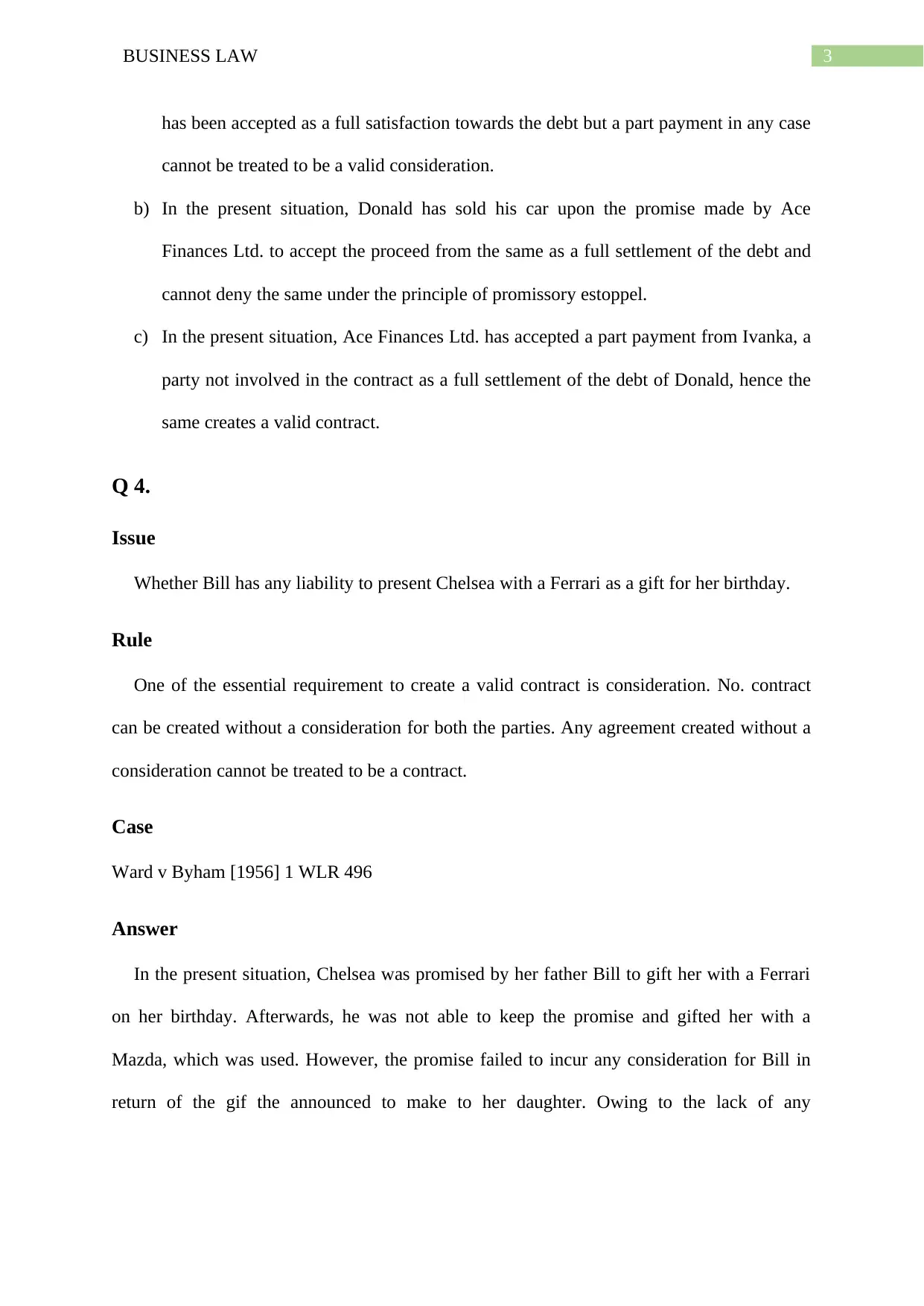
3BUSINESS LAW
has been accepted as a full satisfaction towards the debt but a part payment in any case
cannot be treated to be a valid consideration.
b) In the present situation, Donald has sold his car upon the promise made by Ace
Finances Ltd. to accept the proceed from the same as a full settlement of the debt and
cannot deny the same under the principle of promissory estoppel.
c) In the present situation, Ace Finances Ltd. has accepted a part payment from Ivanka, a
party not involved in the contract as a full settlement of the debt of Donald, hence the
same creates a valid contract.
Q 4.
Issue
Whether Bill has any liability to present Chelsea with a Ferrari as a gift for her birthday.
Rule
One of the essential requirement to create a valid contract is consideration. No. contract
can be created without a consideration for both the parties. Any agreement created without a
consideration cannot be treated to be a contract.
Case
Ward v Byham [1956] 1 WLR 496
Answer
In the present situation, Chelsea was promised by her father Bill to gift her with a Ferrari
on her birthday. Afterwards, he was not able to keep the promise and gifted her with a
Mazda, which was used. However, the promise failed to incur any consideration for Bill in
return of the gif the announced to make to her daughter. Owing to the lack of any
has been accepted as a full satisfaction towards the debt but a part payment in any case
cannot be treated to be a valid consideration.
b) In the present situation, Donald has sold his car upon the promise made by Ace
Finances Ltd. to accept the proceed from the same as a full settlement of the debt and
cannot deny the same under the principle of promissory estoppel.
c) In the present situation, Ace Finances Ltd. has accepted a part payment from Ivanka, a
party not involved in the contract as a full settlement of the debt of Donald, hence the
same creates a valid contract.
Q 4.
Issue
Whether Bill has any liability to present Chelsea with a Ferrari as a gift for her birthday.
Rule
One of the essential requirement to create a valid contract is consideration. No. contract
can be created without a consideration for both the parties. Any agreement created without a
consideration cannot be treated to be a contract.
Case
Ward v Byham [1956] 1 WLR 496
Answer
In the present situation, Chelsea was promised by her father Bill to gift her with a Ferrari
on her birthday. Afterwards, he was not able to keep the promise and gifted her with a
Mazda, which was used. However, the promise failed to incur any consideration for Bill in
return of the gif the announced to make to her daughter. Owing to the lack of any
Paraphrase This Document
Need a fresh take? Get an instant paraphrase of this document with our AI Paraphraser
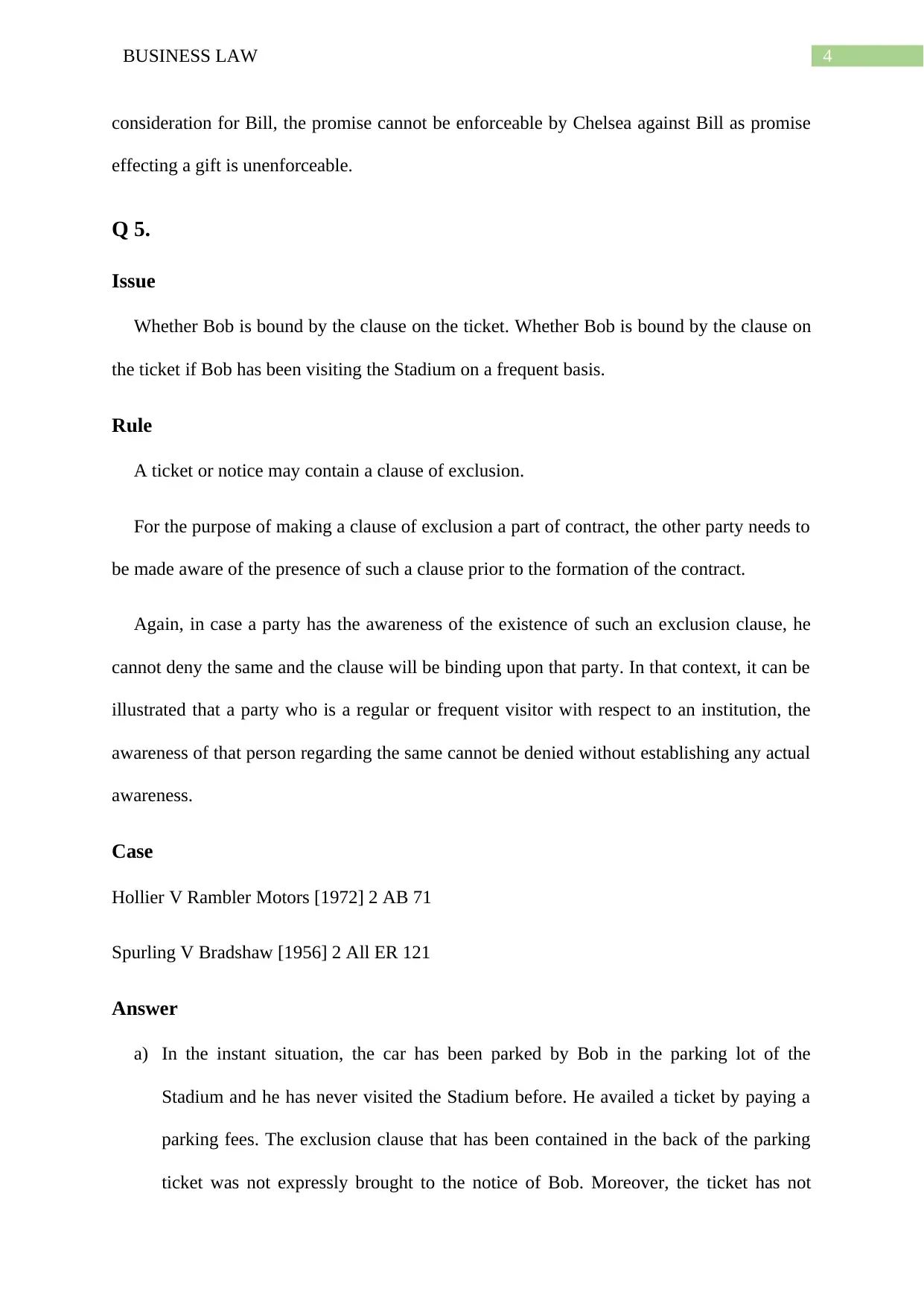
4BUSINESS LAW
consideration for Bill, the promise cannot be enforceable by Chelsea against Bill as promise
effecting a gift is unenforceable.
Q 5.
Issue
Whether Bob is bound by the clause on the ticket. Whether Bob is bound by the clause on
the ticket if Bob has been visiting the Stadium on a frequent basis.
Rule
A ticket or notice may contain a clause of exclusion.
For the purpose of making a clause of exclusion a part of contract, the other party needs to
be made aware of the presence of such a clause prior to the formation of the contract.
Again, in case a party has the awareness of the existence of such an exclusion clause, he
cannot deny the same and the clause will be binding upon that party. In that context, it can be
illustrated that a party who is a regular or frequent visitor with respect to an institution, the
awareness of that person regarding the same cannot be denied without establishing any actual
awareness.
Case
Hollier V Rambler Motors [1972] 2 AB 71
Spurling V Bradshaw [1956] 2 All ER 121
Answer
a) In the instant situation, the car has been parked by Bob in the parking lot of the
Stadium and he has never visited the Stadium before. He availed a ticket by paying a
parking fees. The exclusion clause that has been contained in the back of the parking
ticket was not expressly brought to the notice of Bob. Moreover, the ticket has not
consideration for Bill, the promise cannot be enforceable by Chelsea against Bill as promise
effecting a gift is unenforceable.
Q 5.
Issue
Whether Bob is bound by the clause on the ticket. Whether Bob is bound by the clause on
the ticket if Bob has been visiting the Stadium on a frequent basis.
Rule
A ticket or notice may contain a clause of exclusion.
For the purpose of making a clause of exclusion a part of contract, the other party needs to
be made aware of the presence of such a clause prior to the formation of the contract.
Again, in case a party has the awareness of the existence of such an exclusion clause, he
cannot deny the same and the clause will be binding upon that party. In that context, it can be
illustrated that a party who is a regular or frequent visitor with respect to an institution, the
awareness of that person regarding the same cannot be denied without establishing any actual
awareness.
Case
Hollier V Rambler Motors [1972] 2 AB 71
Spurling V Bradshaw [1956] 2 All ER 121
Answer
a) In the instant situation, the car has been parked by Bob in the parking lot of the
Stadium and he has never visited the Stadium before. He availed a ticket by paying a
parking fees. The exclusion clause that has been contained in the back of the parking
ticket was not expressly brought to the notice of Bob. Moreover, the ticket has not
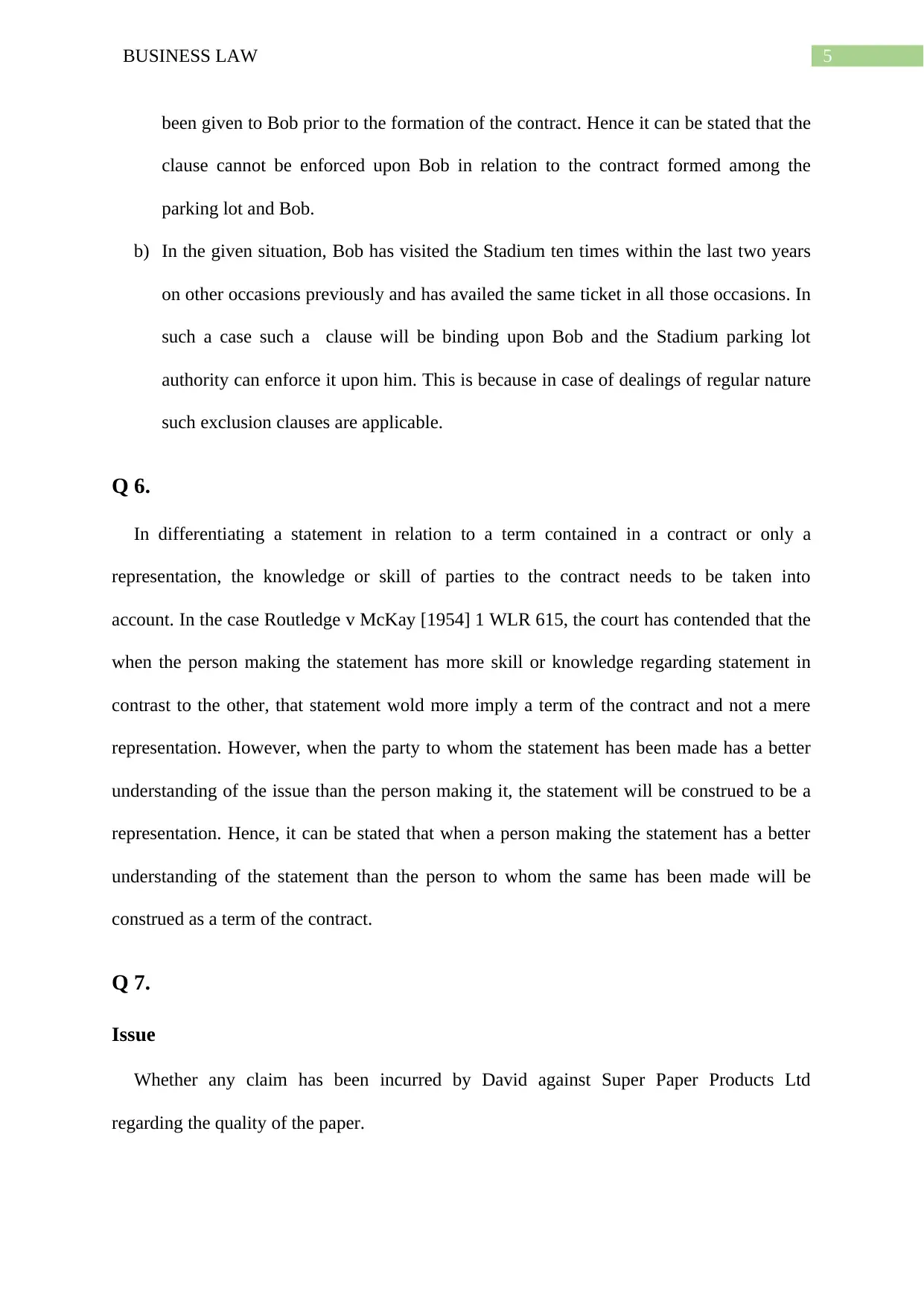
5BUSINESS LAW
been given to Bob prior to the formation of the contract. Hence it can be stated that the
clause cannot be enforced upon Bob in relation to the contract formed among the
parking lot and Bob.
b) In the given situation, Bob has visited the Stadium ten times within the last two years
on other occasions previously and has availed the same ticket in all those occasions. In
such a case such a clause will be binding upon Bob and the Stadium parking lot
authority can enforce it upon him. This is because in case of dealings of regular nature
such exclusion clauses are applicable.
Q 6.
In differentiating a statement in relation to a term contained in a contract or only a
representation, the knowledge or skill of parties to the contract needs to be taken into
account. In the case Routledge v McKay [1954] 1 WLR 615, the court has contended that the
when the person making the statement has more skill or knowledge regarding statement in
contrast to the other, that statement wold more imply a term of the contract and not a mere
representation. However, when the party to whom the statement has been made has a better
understanding of the issue than the person making it, the statement will be construed to be a
representation. Hence, it can be stated that when a person making the statement has a better
understanding of the statement than the person to whom the same has been made will be
construed as a term of the contract.
Q 7.
Issue
Whether any claim has been incurred by David against Super Paper Products Ltd
regarding the quality of the paper.
been given to Bob prior to the formation of the contract. Hence it can be stated that the
clause cannot be enforced upon Bob in relation to the contract formed among the
parking lot and Bob.
b) In the given situation, Bob has visited the Stadium ten times within the last two years
on other occasions previously and has availed the same ticket in all those occasions. In
such a case such a clause will be binding upon Bob and the Stadium parking lot
authority can enforce it upon him. This is because in case of dealings of regular nature
such exclusion clauses are applicable.
Q 6.
In differentiating a statement in relation to a term contained in a contract or only a
representation, the knowledge or skill of parties to the contract needs to be taken into
account. In the case Routledge v McKay [1954] 1 WLR 615, the court has contended that the
when the person making the statement has more skill or knowledge regarding statement in
contrast to the other, that statement wold more imply a term of the contract and not a mere
representation. However, when the party to whom the statement has been made has a better
understanding of the issue than the person making it, the statement will be construed to be a
representation. Hence, it can be stated that when a person making the statement has a better
understanding of the statement than the person to whom the same has been made will be
construed as a term of the contract.
Q 7.
Issue
Whether any claim has been incurred by David against Super Paper Products Ltd
regarding the quality of the paper.
⊘ This is a preview!⊘
Do you want full access?
Subscribe today to unlock all pages.

Trusted by 1+ million students worldwide
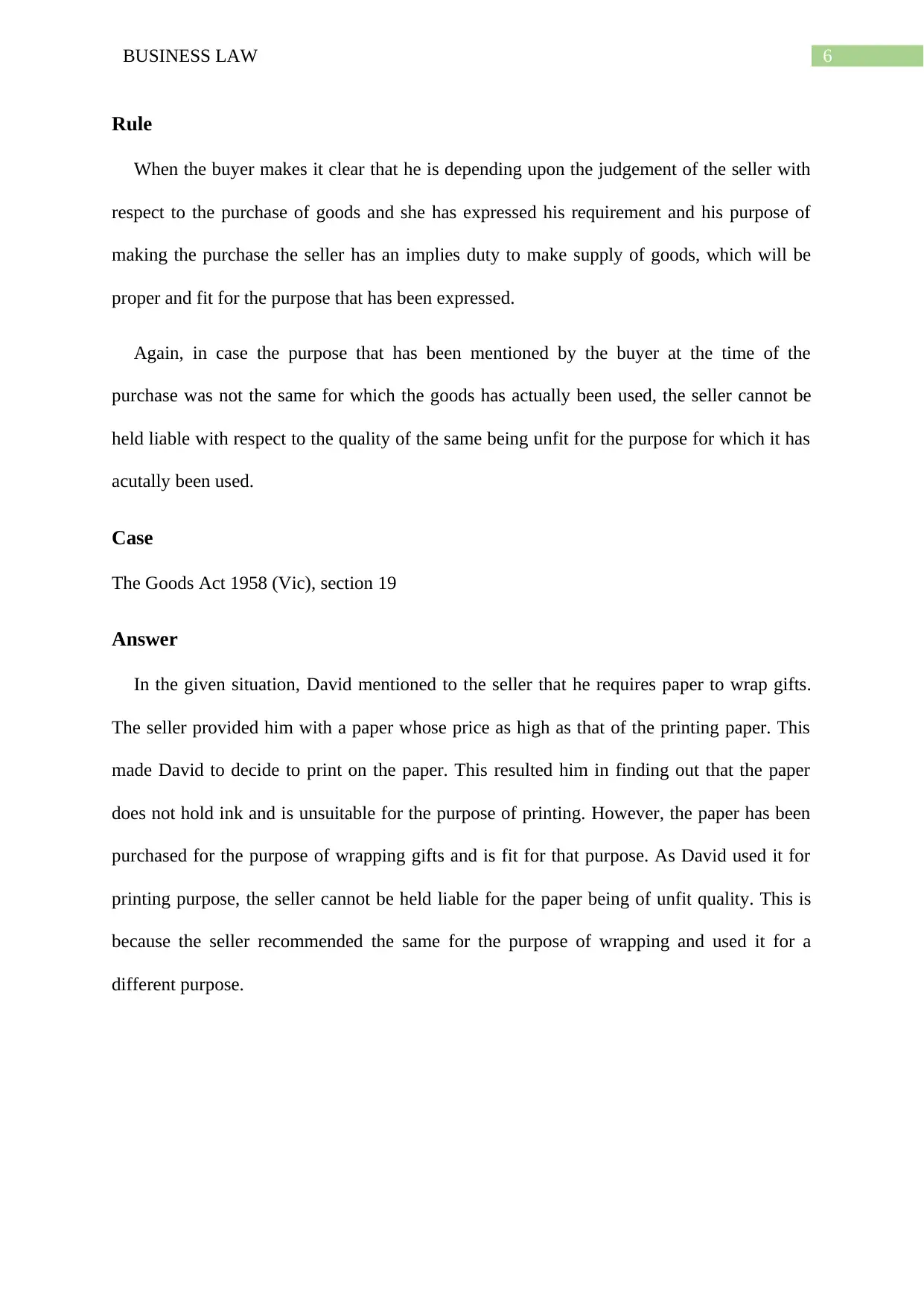
6BUSINESS LAW
Rule
When the buyer makes it clear that he is depending upon the judgement of the seller with
respect to the purchase of goods and she has expressed his requirement and his purpose of
making the purchase the seller has an implies duty to make supply of goods, which will be
proper and fit for the purpose that has been expressed.
Again, in case the purpose that has been mentioned by the buyer at the time of the
purchase was not the same for which the goods has actually been used, the seller cannot be
held liable with respect to the quality of the same being unfit for the purpose for which it has
acutally been used.
Case
The Goods Act 1958 (Vic), section 19
Answer
In the given situation, David mentioned to the seller that he requires paper to wrap gifts.
The seller provided him with a paper whose price as high as that of the printing paper. This
made David to decide to print on the paper. This resulted him in finding out that the paper
does not hold ink and is unsuitable for the purpose of printing. However, the paper has been
purchased for the purpose of wrapping gifts and is fit for that purpose. As David used it for
printing purpose, the seller cannot be held liable for the paper being of unfit quality. This is
because the seller recommended the same for the purpose of wrapping and used it for a
different purpose.
Rule
When the buyer makes it clear that he is depending upon the judgement of the seller with
respect to the purchase of goods and she has expressed his requirement and his purpose of
making the purchase the seller has an implies duty to make supply of goods, which will be
proper and fit for the purpose that has been expressed.
Again, in case the purpose that has been mentioned by the buyer at the time of the
purchase was not the same for which the goods has actually been used, the seller cannot be
held liable with respect to the quality of the same being unfit for the purpose for which it has
acutally been used.
Case
The Goods Act 1958 (Vic), section 19
Answer
In the given situation, David mentioned to the seller that he requires paper to wrap gifts.
The seller provided him with a paper whose price as high as that of the printing paper. This
made David to decide to print on the paper. This resulted him in finding out that the paper
does not hold ink and is unsuitable for the purpose of printing. However, the paper has been
purchased for the purpose of wrapping gifts and is fit for that purpose. As David used it for
printing purpose, the seller cannot be held liable for the paper being of unfit quality. This is
because the seller recommended the same for the purpose of wrapping and used it for a
different purpose.
Paraphrase This Document
Need a fresh take? Get an instant paraphrase of this document with our AI Paraphraser
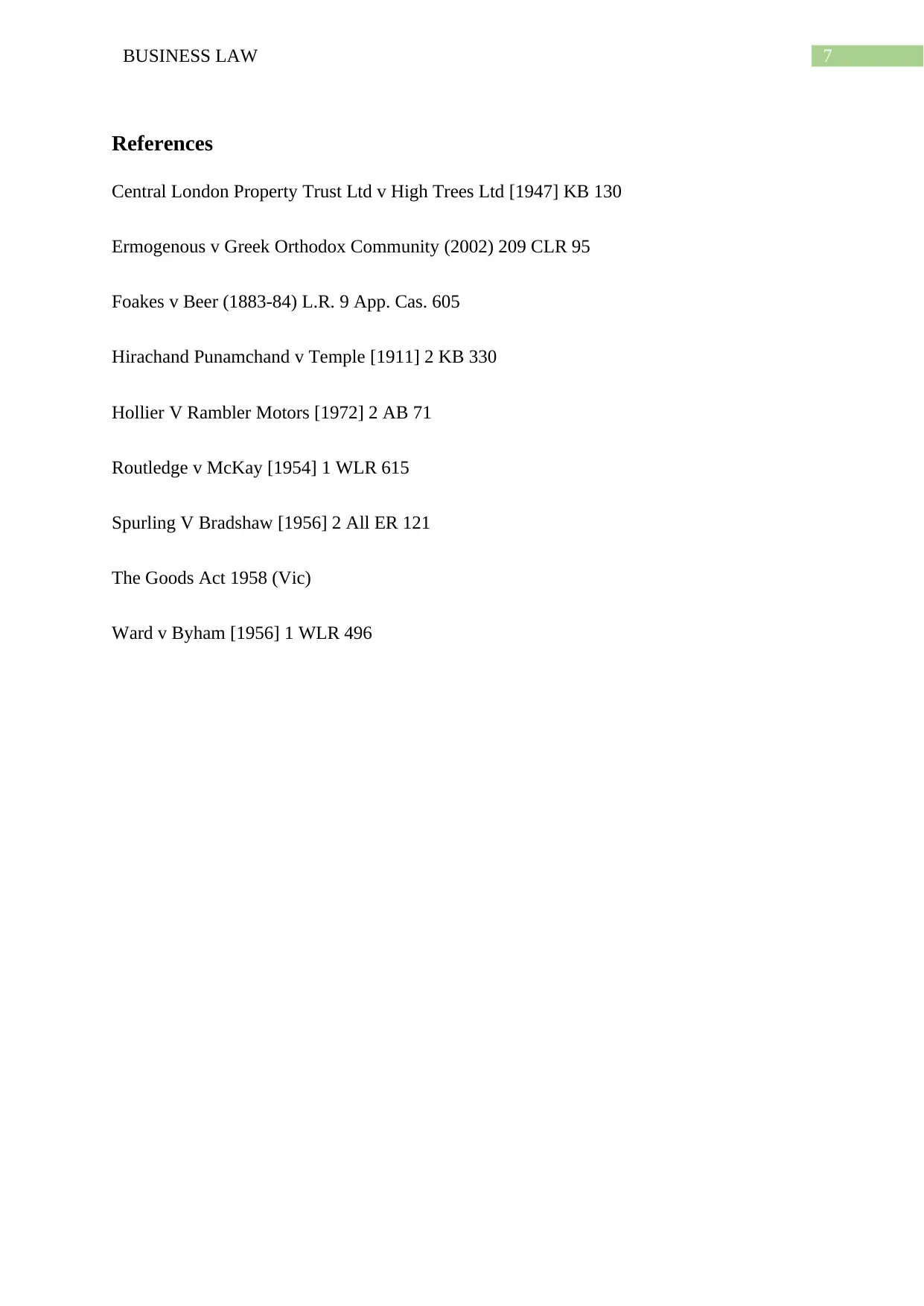
7BUSINESS LAW
References
Central London Property Trust Ltd v High Trees Ltd [1947] KB 130
Ermogenous v Greek Orthodox Community (2002) 209 CLR 95
Foakes v Beer (1883-84) L.R. 9 App. Cas. 605
Hirachand Punamchand v Temple [1911] 2 KB 330
Hollier V Rambler Motors [1972] 2 AB 71
Routledge v McKay [1954] 1 WLR 615
Spurling V Bradshaw [1956] 2 All ER 121
The Goods Act 1958 (Vic)
Ward v Byham [1956] 1 WLR 496
References
Central London Property Trust Ltd v High Trees Ltd [1947] KB 130
Ermogenous v Greek Orthodox Community (2002) 209 CLR 95
Foakes v Beer (1883-84) L.R. 9 App. Cas. 605
Hirachand Punamchand v Temple [1911] 2 KB 330
Hollier V Rambler Motors [1972] 2 AB 71
Routledge v McKay [1954] 1 WLR 615
Spurling V Bradshaw [1956] 2 All ER 121
The Goods Act 1958 (Vic)
Ward v Byham [1956] 1 WLR 496
1 out of 8
Related Documents
Your All-in-One AI-Powered Toolkit for Academic Success.
+13062052269
info@desklib.com
Available 24*7 on WhatsApp / Email
![[object Object]](/_next/static/media/star-bottom.7253800d.svg)
Unlock your academic potential
Copyright © 2020–2026 A2Z Services. All Rights Reserved. Developed and managed by ZUCOL.




